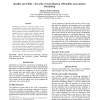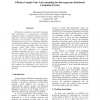237 search results - page 14 / 48 » Policies for Dynamic Clock Scheduling |
AIPS
2003
13 years 11 months ago
2003
Scheduling algorithms for real-time systems can be characterized in various ways, one of the most important ones of which is the underlying task model. Many concepts of real-time ...
TVLSI
2008
13 years 9 months ago
2008
Thermal hot spots and high temperature gradients degrade reliability and performance, and increase cooling costs and leakage power. In this paper, we explore the benefits of temper...
ECRTS
2005
IEEE
14 years 3 months ago
2005
IEEE
Slowdown based on dynamic voltage scaling (DVS) provides the ability to perform an energy-delay tradeoff in the system. Non-preemptive scheduling becomes an integral part of syste...
ICPADS
2006
IEEE
14 years 4 months ago
2006
IEEE
Efficient task scheduling is essential for obtaining high performance in heterogeneous distributed computing systems (or HeDCSs). Because of its key importance, several scheduling...
MOBISYS
2005
ACM
14 years 9 months ago
2005
ACM
Inverse multiplexing, or network striping, allows the construction of a high-bandwidth virtual channel from a collection of multiple low-bandwidth network channels. Striping syste...




